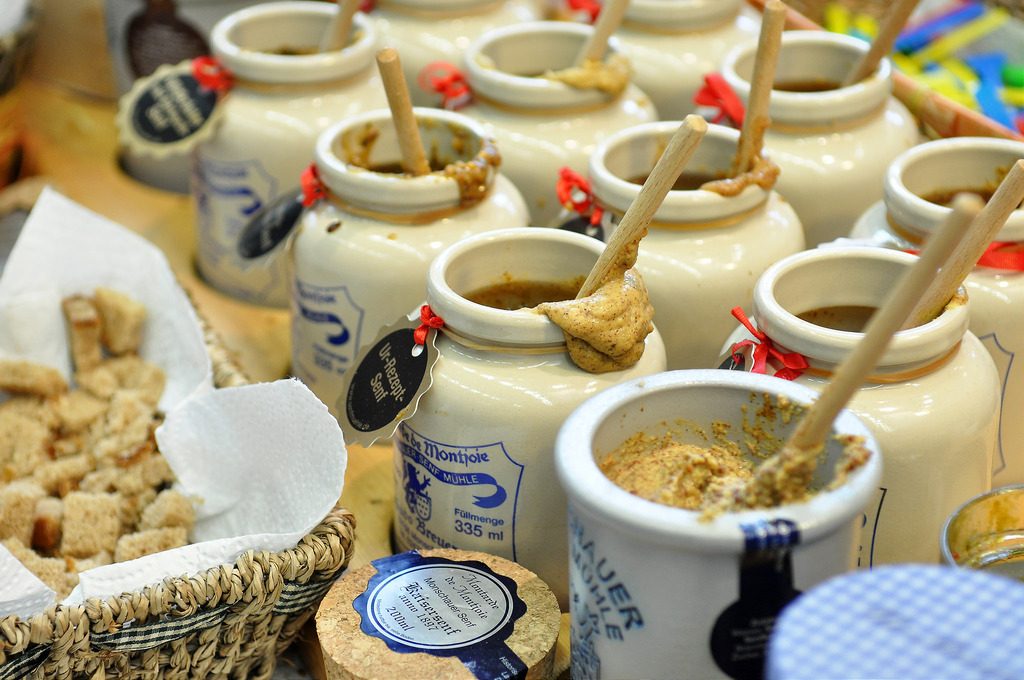Sayings + Expressions 17: The Senf and the Salat Posted by Sten on Jul 26, 2018 in Culture, Food, Language
In our series on sayings and expressions, we have gone through many different themes. Today, we will have a look at two food items, that don’t really go together, but work quite complementary in the realm of sayings and expressions. Let’s dive in, and as always, start with the saying!
Da haben wir den Salat!
Literally: There we have the salad!
What did I tell you! / Now we are in a fine mess!
Since the mid-19th Jahrhundert (century), Salat is also used to refer to Unordnung (mess) or a Durcheinander (jumble). And that makes sense, a Salat is a cacophony of ingredients, forming a mix of colors and tastes. It’s a mess!
So how would you use it in an example sentence?
Jan nimmt den Kochtopf von der Herdplatte, aber er ist zu schwer – der Topf kippt und die Suppe läuft auf den Boden. Jetzt haben wir den Salat!
Jan takes the pot from the stove, but it is too heavy – the pot tips over and the soup runs all over the floor. Now we have the salad! (Now we are in a fine mess!)
Nur weil der Chef seinen Senf dazu geben musste, ist das Projekt jetzt zu teuer. Ich habe noch so davor gewarnt, aber jetzt haben wir den Salat!
Just because the boss had to get his two cents in, the project is now too expensive. I strongly warned you, but now we have the salad! (What did I tell you!)
seinen/ihren Senf dazu geben
Literally: to add his/her mustard
to get his/her two cents in
As you could see in the example above, when the Chef (boss) has to add his mustard, things may not go so well. This is mostly because this expression does not have a very positive connotation. den Senf dazu geben is often used if a contribution is not valued a lot. In the example above, the boss had to add his own points – his Senf – and it destroyed the project – which led to the salad the employees face now!
But why mustard? What does it have to do with this?
The spice of Senf can destroy a meal if (too much) of it is added to a meal. And a conversation works the same way: if too many different opinions and (repetitive) points of view are added, it only makes things worse. This is where the negative connotation comes from. Already since about 1700, this expression has been used.
Example:
Dieses Besprechung ist schon lange genug. Und jetzt muss Timo auch noch seinen Senf dazu geben!
This meeting is already long enough. And now also Timo still has to get his two cents in!
Now, den Senf dazu geben can also be a bit positive with a little bit of irony – for example:
Im Internet kann jeder, auch ich, seinen Senf dazu geben – und das ist eine tolle Sache!
On the internet, everybody can get their two cents in – and that is a great thing!
What do you think of this saying and the expression? Do you have similar ones in your language? Let me know in the comments below!

Build vocabulary, practice pronunciation, and more with Transparent Language Online. Available anytime, anywhere, on any device.







Comments:
BARBARA OBERDING:
again you did well with your expressions, I pass them on to our German Club Deutscher Club Clark NJ where we have German lessons and a monthly Stammtisch. Your posts are wonderful for me as I teach and lead the conversations Herzlichen Dank. Barbara
Sten:
@BARBARA OBERDING That’s so cool!
If you ever have a certain topic you would like to know more about, just comment – perhaps I can write a post about it!